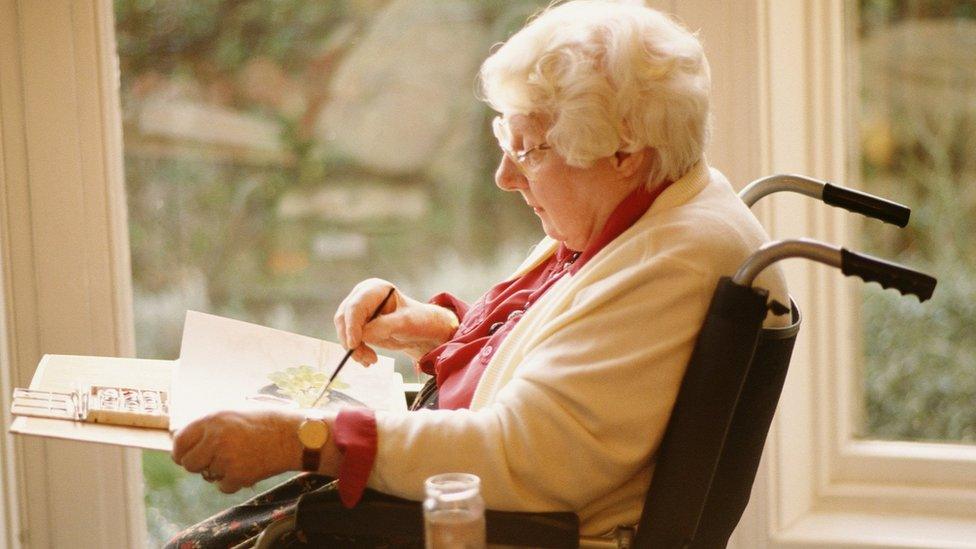National Care Service for Scotland will 'end postcode lottery'
- Published
- comments

The creation of a National Care Service for Scotland (NCS) will end the "postcode lottery" in the sector, Health Secretary Humza Yousaf has said.
He said new legislation would make ministers accountable for adult social care in Scotland.
Mr Yousaf described the move as the most significant since the creation of the NHS.
It follows an independent review, external into the future of adult social care triggered by the pandemic.
The service, which will be launched by the end of the parliamentary term in 2026, could cost up to £0.5bn to deliver.
Own homes
The new bill proposes setting up a series of care boards that operate in the same way as health boards, with Scottish ministers directly responsible.
It means local authorities would no longer run social care services.
Scottish Labour have accused the government of "the biggest power grab in the history of Holyrood" and said it would undermine local government.
And while some charities have welcomed the legislation, they say social care faces a crisis now.
The new service will aim to support people in their own homes or among family, friends and community wherever possible.
It will create a charter of rights and responsibilities for social care, with a robust complaints and redress process.

Additional measures include the introduction of rights to breaks for unpaid carers and visiting rights for residents living in adult care homes, giving legal force to Anne's Law, external.
This secures the right of care home residents to have visits from a loved one - even in a Covid outbreak.
The NCS will also ensure fair employment practices and national pay bargaining for the social care workforce and focus on prevention and early intervention before people's needs escalate.
A further development will see the creation of a new National Social Work Agency to promote training and development, provide national leadership and set and monitor standards in social work.


There has been plenty of debate about how to improve community health and social care in Scotland. An ageing population with more complex health needs is increasingly putting pressure on a system short of staff and capacity.
A government review published last year recommended setting up a National Care Service to level out access to services across Scotland and to help address demand.
What we are seeing today with this new legislation is the first steps of that becoming a reality.
Essentially, the government is replacing provision run by local authorities with a series of care boards answerable to Scottish ministers.
The pandemic cast a light on rights for care home relatives and carers and there are also proposals to improve those.
The health secretary has billed this legislation as the most ambitious since the creation of the NHS but given the scale of the challenge and the short timeframe to deliver, it appears that much of the detail is still to be worked out along the way.
The aim is to have the new service operational by the end of the parliamentary term, but the main issue facing social care is that there is an shortage of provision now.

Speaking on a visit to Aberdeen-based charity VSA, Mr Yousaf said: "This is the most ambitious reform of public services since the creation of the NHS.
"The design of the NCS will have human rights embedded throughout, and the actual shape and detail of how the NCS works will be designed with those who have direct experience of accessing and providing social care.
"We are going to end the postcode lottery of care in Scotland."
The health secretary pledged everyone would have access to "consistently high-quality care and support so they can live a full life".
But Scottish Labour health spokeswoman Jackie Baillie, said: "After years of steadfast opposition to a National Care Service, the SNP is now using the creation of such a service to disempower local government and centralise yet more power."
She added that the transfer of more than 100,000 staff away from local authorities was a "recipe for chaos and "uncertainty".
Scottish Conservative social care spokesman Craig Hoy urged the SNP to scrap the plans because of the huge costs involved in setting it up.
Mr Hoy said: "Social care provision in Scotland is in crisis. But the last thing we need right now is a major bureaucratic overhaul of the system which would see precious resources diverted away from the frontline and into employing hundreds more management and admin staff.
'Recipe for disaster'
Wendy Dunsmore of Unite also condemned the proposals and said Scottish ministers would be "able to unilaterally decide what services are to be delivered nationally or locally".
She said: "The plans to transfer services, people and property from local authorities to the Scottish government are a recipe for disaster and represent an all-out assault on local democracy."
Keir Greenaway, GMB Scotland senior organiser, said workers "haven't even been an afterthought" in drafting the bill.
He added: "Care staff who worked on the frontline throughout the pandemic and continue to care for our most vulnerable cannot afford to wait for improved terms and conditions.
"There is plenty on new executive boards of bureaucrats, and their pay and pensions, but there is no mention of how care workers can improve their pay."
Local government body Cosla said it would take the time to understand the breadth of the impact the legislation would have on communities across Scotland.
Health and social care spokesman Paul Kelly said: "Our primary considerations are the effective delivery of vital social care services to the communities we serve and the wellbeing of our workforce.
"We would reiterate our previous position that local democratic accountability is central to the way in which social care services are delivered.
"We are also clear that there are underlying challenges across the system requiring urgent and significant improvement, and which cannot wait for a National Care Service."